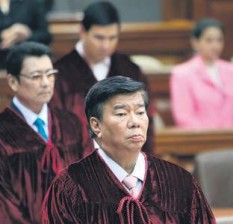Reversal of roles: Santiago purrs, Drilon roars
At the start of Chief Justice Renato Corona’s defense presentation, Senator Miriam Defensor-Santiago was uncharacteristically meek as a lamb, while Senator Franklin Drilon, roared like a lion.
As Santiago delivered the opening prayer on Monday, gone was the famous temper that led to a prosecution volunteer lawyer being cited in contempt for being disrespectful to the court.
Santiago politely reminded the defense panel that it was estopped from questioning the jurisdiction of the Senate, sitting as an impeachment court, at this stage of the proceeding.
“There is no constitutional issue involved,” said Santiago, explaining that it was “discretionary” on the part of any court to grant a preliminary hearing after a complaint had been filed.
Drilon briefly took the floor, but two minutes were enough to trigger yet another tense moment at the hearing.
Drilon blew his top over remarks of the lead defense counsel, Serafin Cuevas, that the senator was sounding like a member of the prosecution. Drilon has repeatedly been slammed for helping the prosecution fish for evidence.
“If that commentary was made by the members of the prosecution, we would have no objection,” Cuevas said.
“We are worried that this will be interpreted as an argument by a prosecutor,” he added.
Improper
A peeved Drilon shot back: “I take exception to the statement of the defense counsel, and that is totally improper. We are just reading …”
But Cuevas interrupted Drilon, prompting the senator to declare: “I’m still speaking.”
Unperturbed, Cuevas bluntly told the senator to “go ahead.”
Drilon—staring at Cuevas who was just a few steps in front of the senator—warned the lawyer, saying: “Then don’t interrupt … because I was just explaining the ruling of the court.”
Before matters got out of hand, Senate President Juan Ponce Enrile ordered Majority Leader Vicente Sotto III “to reread the (January18) ruling of this court.”
The verbal tussle was triggered by Drilon’s manifestation that the defense, in seeking to have the court validate the signatures of the 188 House members who impeached the Chief Justice on Dec. 12, 2011, was “making a plea that they be allowed to present evidence on their affirmative defenses.”
According to Drilon, the defense panel asserted that the January 18 ruling of the impeachment court did not touch upon the “affirmative defenses” but only the motion for a preliminary hearing.
“The grounds relied upon by the affirmative defenses are precisely the grounds relied upon when the defense asked for on a preliminary hearing; and, in fact, on page 2 of the resolution of January 18, the Chief Justice (asserted) that since the verified complaint for impeachment lacks a proper verification, it should be treated as an unsigned pleading which produces no legal effect, and should therefore be dismissed,” Drilon said.
Estrada precedent
Drilon disagreed with this contention, saying that the January 18 ruling “categorically validated the verification.”
Quoting the ruling, the senator said: “It appeared that the filing of the verified impeachment complaint was made in accordance with … the Constitution, there is no more need for a preliminary hearing to receive evidence on this matter.”
The senator then explained that if there was no need to present evidence on the matter of preliminary hearing, then “there is no need to present evidence on the affirmative defenses.”
Senator Joker Arroyo also appeared annoyed at the defense for wanting to dismiss the impeachment on procedural grounds. He said he was part of the prosecution in the 2000 impeachment trial of President Joseph Estrada.
“The same issues arose—the defects and all. Our argument was that the House impeaches. The Senate hears and decides,” Arroyo said.
“What the House transmits to the Senate—faults and all—everything, defects and all, will have to be accepted by the Senate because the Senate cannot direct the House on how to make an impeachment complaint because the Constitution simply says that the House impeaches, the Senate tries and decides,” he added.















